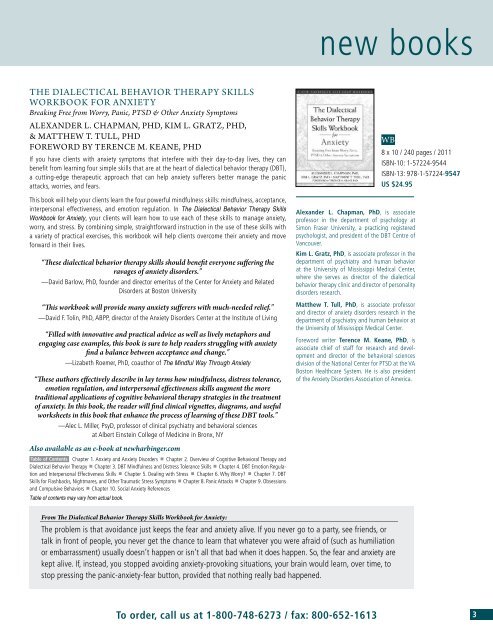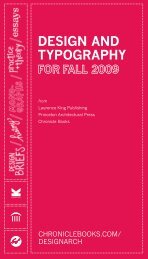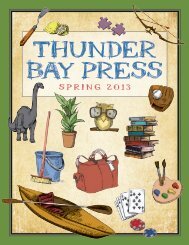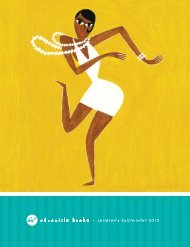Fall 2011/Winter 2012 Professional Catalogue ... - Raincoast Books
Fall 2011/Winter 2012 Professional Catalogue ... - Raincoast Books
Fall 2011/Winter 2012 Professional Catalogue ... - Raincoast Books
You also want an ePaper? Increase the reach of your titles
YUMPU automatically turns print PDFs into web optimized ePapers that Google loves.
thE DIAlECtICAl BEhAvIOR thERAPy SKIllS<br />
WORKBOOK FOR ANxIEty<br />
Breaking Free from Worry, Panic, PTSD & Other Anxiety Symptoms<br />
AlExANDER l. ChAPMAN, PhD, KIM l. gRAtz, PhD,<br />
& MAtthEW t. tUll, PhD<br />
FOREWORD By tERENCE M. KEANE, PhD<br />
If you have clients with anxiety symptoms that interfere with their day-to-day lives, they can<br />
benefit from learning four simple skills that are at the heart of dialectical behavior therapy (DBT),<br />
a cutting-edge therapeutic approach that can help anxiety sufferers better manage the panic<br />
attacks, worries, and fears.<br />
This book will help your clients learn the four powerful mindfulness skills: mindfulness, acceptance,<br />
interpersonal effectiveness, and emotion regulation. In The Dialectical Behavior Therapy Skills<br />
Workbook for Anxiety, your clients will learn how to use each of these skills to manage anxiety,<br />
worry, and stress. By combining simple, straightforward instruction in the use of these skills with<br />
a variety of practical exercises, this workbook will help clients overcome their anxiety and move<br />
forward in their lives.<br />
“These dialectical behavior therapy skills should benefit everyone suffering the<br />
ravages of anxiety disorders.”<br />
—David Barlow, PhD, founder and director emeritus of the Center for Anxiety and Related<br />
Disorders at Boston University<br />
“This workbook will provide many anxiety sufferers with much-needed relief.”<br />
—David F. Tolin, PhD, ABPP, director of the Anxiety Disorders Center at the Institute of Living<br />
“Filled with innovative and practical advice as well as lively metaphors and<br />
engaging case examples, this book is sure to help readers struggling with anxiety<br />
find a balance between acceptance and change.”<br />
—Lizabeth Roemer, PhD, coauthor of The Mindful Way Through Anxiety<br />
“These authors effectively describe in lay terms how mindfulness, distress tolerance,<br />
emotion regulation, and interpersonal effectiveness skills augment the more<br />
traditional applications of cognitive behavioral therapy strategies in the treatment<br />
of anxiety. In this book, the reader will find clinical vignettes, diagrams, and useful<br />
worksheets in this book that enhance the process of learning of these DBT tools.”<br />
—Alec L. Miller, PsyD, professor of clinical psychiatry and behavioral sciences<br />
at Albert Einstein College of Medicine in Bronx, NY<br />
Also available as an e-book at newharbinger.com<br />
Table of Contents Chapter 1. Anxiety and Anxiety Disorders n Chapter 2. Overview of Cognitive Behavioral Therapy and<br />
Dialectical Behavior Therapy n Chapter 3. DBT Mindfulness and Distress Tolerance Skills n Chapter 4. DBT Emotion Regulation<br />
and Interpersonal Effectiveness Skills n Chapter 5. Dealing with Stress n Chapter 6. Why Worry? n Chapter 7. DBT<br />
Skills for Flashbacks, Nightmares, and Other Traumatic Stress Symptoms n Chapter 8. Panic Attacks n Chapter 9. Obsessions<br />
and Compulsive Behaviors n Chapter 10. Social Anxiety References<br />
Table of contents may vary from actual book.<br />
To order, call us at 1-800-748-6273 / fax: 800-652-1613<br />
new books<br />
Alexander L. Chapman, PhD, is associate<br />
professor in the department of psychology at<br />
Simon Fraser University, a practicing registered<br />
psychologist, and president of the DBT Centre of<br />
Vancouver.<br />
Kim L. Gratz, PhD, is associate professor in the<br />
department of psychiatry and human behavior<br />
at the University of Mississippi Medical Center,<br />
where she serves as director of the dialectical<br />
behavior therapy clinic and director of personality<br />
disorders research.<br />
Matthew T. Tull, PhD, is associate professor<br />
and director of anxiety disorders research in the<br />
department of psychiatry and human behavior at<br />
the University of Mississippi Medical Center.<br />
Foreword writer Terence M. Keane, PhD, is<br />
associate chief of staff for research and development<br />
and director of the behavioral sciences<br />
division of the National Center for PTSD at the VA<br />
Boston Healthcare System. He is also president<br />
of the Anxiety Disorders Association of America.<br />
From The Dialectical Behavior Therapy Skills Workbook for Anxiety:<br />
The problem is that avoidance just keeps the fear and anxiety alive. If you never go to a party, see friends, or<br />
talk in front of people, you never get the chance to learn that whatever you were afraid of (such as humiliation<br />
or embarrassment) usually doesn’t happen or isn’t all that bad when it does happen. So, the fear and anxiety are<br />
kept alive. If, instead, you stopped avoiding anxiety-provoking situations, your brain would learn, over time, to<br />
stop pressing the panic-anxiety-fear button, provided that nothing really bad happened.<br />
8 x 10 / 240 pages / <strong>2011</strong><br />
ISBN-10: 1-57224-9544<br />
ISBN-13: 978-1-57224-9547<br />
US $24.95<br />
3

















